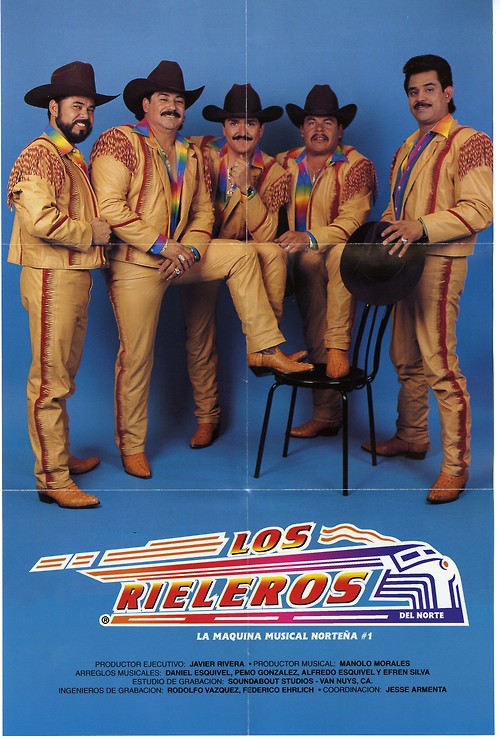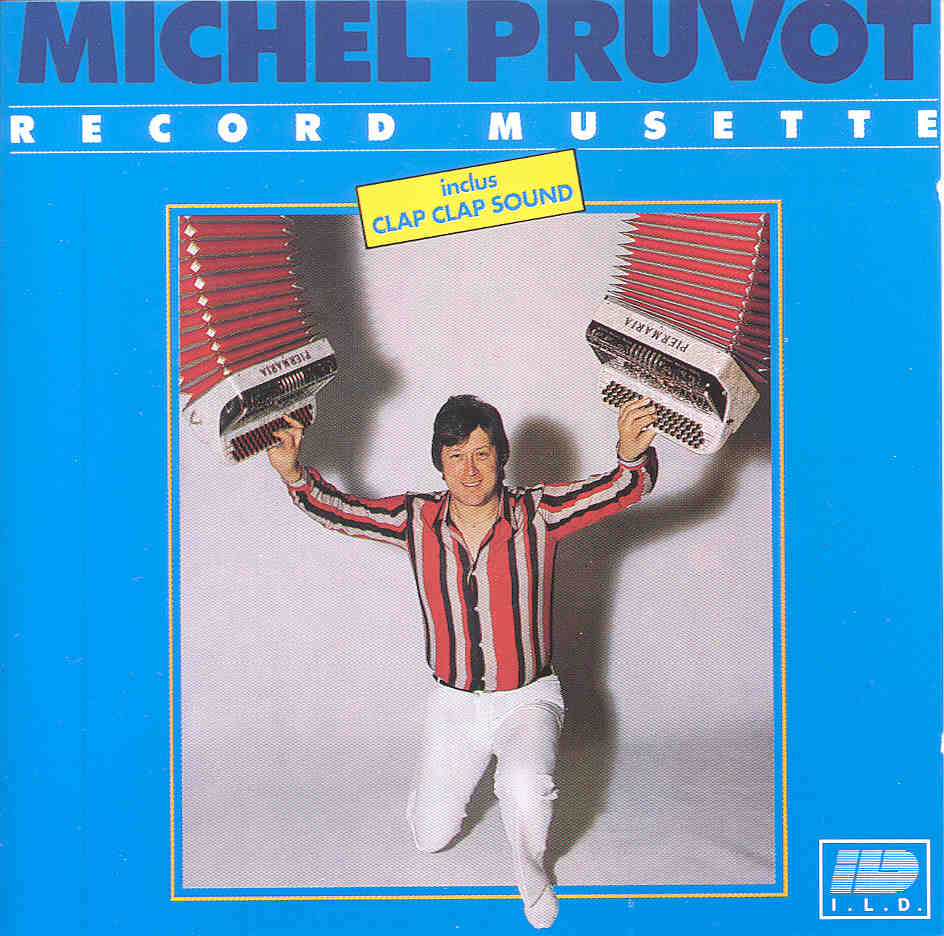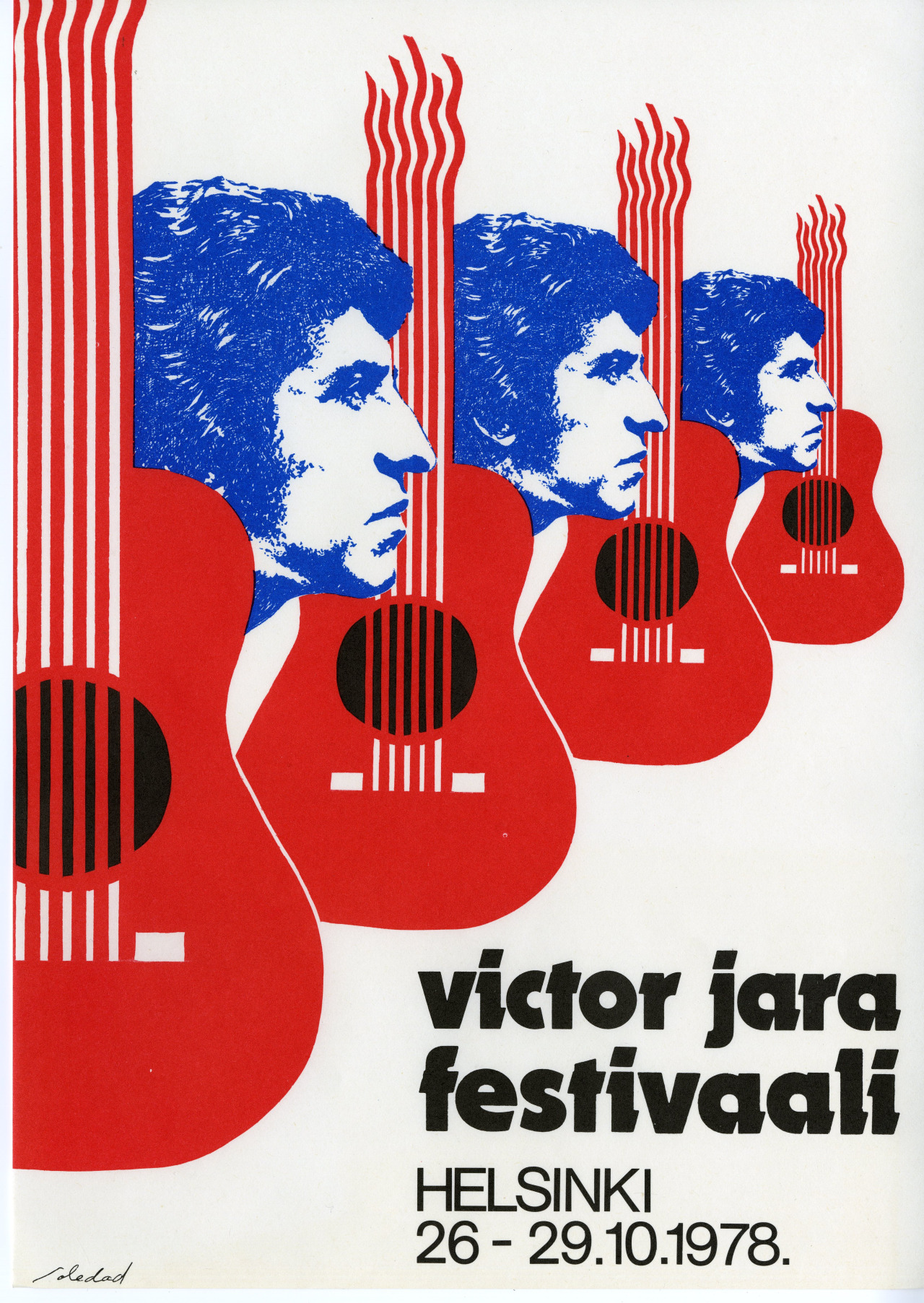 For all workers, past, present, and future on this 126th International Workers’ Day we present this promotional flyer for the 1978 Folk Song Festival in Helsinki Finland, found inserted in a LP sleeve (along with miniature sticker versions of the flyer) in the SFC’s Mike Seeger Collection, FC-25202.
For all workers, past, present, and future on this 126th International Workers’ Day we present this promotional flyer for the 1978 Folk Song Festival in Helsinki Finland, found inserted in a LP sleeve (along with miniature sticker versions of the flyer) in the SFC’s Mike Seeger Collection, FC-25202.
The 1978 festival and flyer honored Chilean activist singer-songwriter Victor Jara who was murdered, along with thousands of other victims, by the Chilean Army a day after the military coup September 11, 1973. Jara’s 1969 composition “Plegaria a un Labrador” (“Public Prayer to a worker”) remains a powerful call for solidarity in the struggle for human rights. Hear Jara perform “Plegeria a un Labrador” with his group Quilapayún here.
Open reel tape, FT9374, in the Broadside Collection (20289) includes recordings from a series of 1974 benefit concerts for Chile organized by Phil Ochs in New York City after the death of President Salvador Allende, Victor Jara, and countless others. Musicians included Larry Estrige, Bob Dylan, Dave Van Ronk, and Arlo Guthrie. The latter performed a song dedicated to the life of Victor Jara based on a poem written by Adrian Miller. Listen to that track below:20289_FT9374_Victory Jara of Chile_Arlo Guthrie_5_9_1974_SouthernFoklifeCollection_UNC_Chapel Hill
And finally on this May Day we would like to leave you with one of Woody Guthrie’s protest ballads, “Deportee (Plane Wreck at Los Gatos).” The heartbreaking song memorializes the nameless migrants killed in a plane crash in Los Gatos canyon in 1948. It is sung by Sis Cunningham, recorded on FS5695 in the Broadside Collection (20289).20289_FS5695_Deportee_Sis Cunningham_Southern Folklife Collection_UNC_Chapel Hill
Category: Cataloger’s Corner
Cataloger's Corner: Stuart Hamblen for President
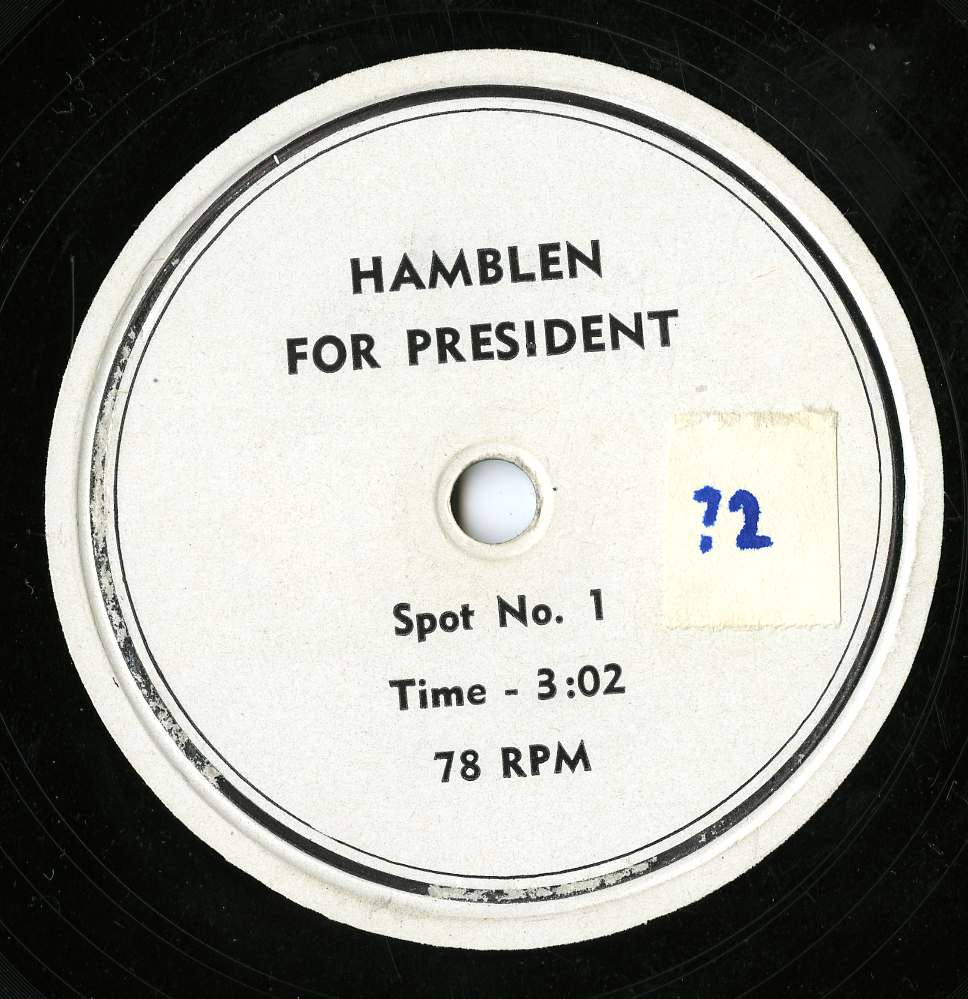
Stuart Hamblen is known today as a singing cowboy who produced radio programs such as “Covered Wagon Jubilee” and eventually “Cowboy Church of the Air.” He was also a major songwriter and recording star—one of the first C&W artists to record for Decca.
A Texas native, Hamblen moved to Los Angeles in the 1920s to start a career in radio. After a brief stint performing with the Beverly Hillbillies, he began hosting his own show. He also began making headlines for his drinking, gambling, and debt-related lawsuits, as well as for owning and training hunting dogs and racehorses. (Incidentally, he was the first person to send a horse to a race on an airplane–Flying Tiger was the name of the airline).
In 1938, Hamblen became one of a series of C&W celebrity-politicians when he ran as a Democrat for congressman of L.A.’s 11th district. (Other examples included W. Lee O’Daniel who served as governor of Texas, Jimmy Davis who served as governor of Louisiana, and Roy Acuff who ran for governor of Tennessee). Hamblen’s candidacy apparently disturbed many Democrats from his district, largely because he campaigned in character, incorporating his guitar and cowboy persona. One Los Angeles Times article referred to him as the “Bourbon candidate for Congress.” Not surprisingly, he did not win.
A decade later, in 1949, Hamblen attended one of evangelist Billy Graham’s tent meetings in Los Angeles—the meeting inspired him to quit drinking and to devote his life to the Christian faith. When his radio station KMTR subsequently asked him to promote a beer brand on air, he refused and lost his show. The beer ad incident put Hamblen on the radar of the Prohibition Party; after General Douglas MacArthur refused the invitation to run as the 1952 Prohibition presidential candidate, Hamblen was recruited for the role. With a retired professor (Enoch A. Holtwick) as a running mate, Hamblen came in 4th place, with 73,412 popular votes.
At the Prohibition Party’s convention, Hamblen played his hit song “It Is No Secret (What God Can Do),” treating it as the theme song of the campaign. At some point during 1951-1952, he used the song as well in a 78rpm recording (likely intended for radio play), entitled “Hamblen for President.” On each side, Hamblen explains his platform and emphasizes that prohibition would not be reinstated if he were elected. A few excerpts from both sides are below.
Hamblen for President, Spot 1
Hamblen for President, Spot 2, beginning
Hamblen for President, Spot 2, middle
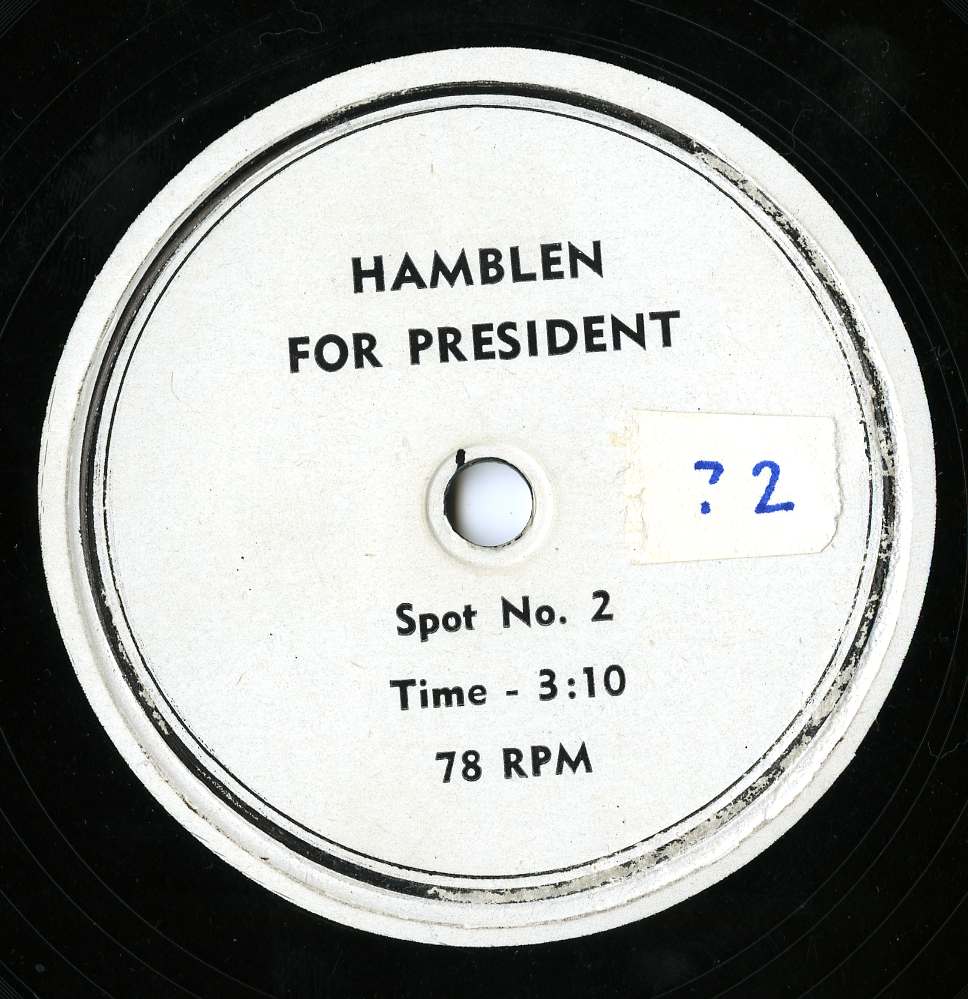
The recording is cataloged and available at the Southern Folklife Collection as 78-17711, along with many of Hamblen’s commercial recordings and reel-to-reel tapes of his radio show “Cowboy Church of the Air.”
Curley Parker & the Garvin Brothers on Cozy Records
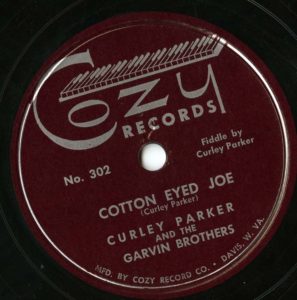 Newly cataloged at the SFC is an obscure bluegrass release on Cozy Records by Curley Parker and the Garvin Brothers, call number 78-17403.
Newly cataloged at the SFC is an obscure bluegrass release on Cozy Records by Curley Parker and the Garvin Brothers, call number 78-17403.
Cozy Records was based in Davis, West Virginia and named after a restaurant in nearby Grafton. It was founded by coal miner and minister John Bava, who’d played and sung along with his wife Lucy in a band called the Country Cousins.
In addition to his record label, Bava also started a magazine called Musical Echoes (printing facilities for which sat in a converted chicken coup), and a music publishing company under his own name. It seems that Bava may have used Musical Echoes partly to promote his compositions among musicians who might perform them. For example, in the SFC’s Sheet Music and Song Lyrics collection, we found this copy of Bava’s composition “Upon the Cross of Calvary” which has a red-and-white sticker referring to Musical Echoes as “song book for the entertainer.”
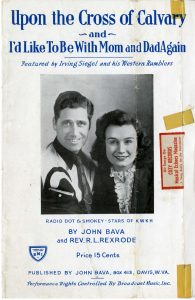
The back cover has been addressed and stamped, with Musical Echoes as the return address. At the bottom, the recipient is told to “request Hank the Cowhand of WMMN, Fairmont, W. Va. to sing ‘Would You Care.’” (Hank recorded this song for Cozy as Hank Stanford & the Sagebrush Round-up some time in the early 1950s; the song was written by Bava).
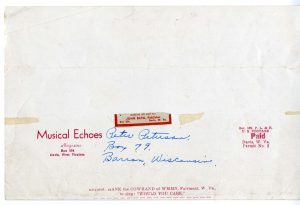 Cozy recorded local, West Virginia-based talent, as well as musicians who appeared regularly on radio but who’d had trouble making inroads with bigger labels. Besides Hank the Cowhand, Cozy artists included Cherokee Sue, Rita Flory, Rex Parker’s Merry Men, Chuck Palmer & the Cornmuffins, and eventually the Lonesome Pine Fiddlers.
Cozy recorded local, West Virginia-based talent, as well as musicians who appeared regularly on radio but who’d had trouble making inroads with bigger labels. Besides Hank the Cowhand, Cozy artists included Cherokee Sue, Rita Flory, Rex Parker’s Merry Men, Chuck Palmer & the Cornmuffins, and eventually the Lonesome Pine Fiddlers.
Curley Parker and the Garvin Brothers only made one recording for Cozy Records, “My Guiding Star” / “Cotton Eyed Joe”, released in 1950. Originally from Gilmer County, Georgia, Parker is today best known for having played fiddle with the Blue Sky Boys during the 1940s, as well as for the duo he started with Pee Wee Lambert in 1951. In addition to his musical career, Parker also worked as a land surveyor; ultimately, he phased out professional music appearances in order to focus on his “day job.”
Side A, “My Guiding Star,” features singing by Parker and Earnst Garvin in a song about the unexpected death of the narrator’s fiancé. We’ve included an excerpt here:
My Guiding Star
Side B, “Cotton Eyed Joe,” is an instrumental, and showcases Parker’s fiddling technique (as well as that of an unnamed banjoist, presumably one of the Garvin Brothers). The virtuosity is especially apparent towards the end when the tempo verges on breakneck.
Cotton Eyed Joe
It does not appear that the Garvin Brothers have any surviving output beyond this release.
Our copy of the Parker-Garvin Brothers release came from SFC donor Guthrie Meade and was autographed by Parker. In the image below, you can (sort of) see the inscription on the lefthand side of the label: “To Gus, Curley Parker.”

Dispatch from Cataloger's Corner: Los Rieleros del Norte
Cataloger's Corner: Barns
Our Photos of the Week this time feature 2 examples of tobacco barns taken from the CD-ROM companion to John Michael Vlach’s 2003 book Barns (Norton/Library of Congress). The book and accompanying disc feature black & white photos of barns across the U.S., taken by a variety of photographers, and currently housed the Prints & Photographs Division of the Library of Congress.


The Barns CD-ROM is now available at the Southern Folklife Collection as call # CD-11794.
Cataloger's Corner: Moondog!
During a recent cataloging session, we stumbled across this 1953 EP by composer/performer/inventor/poet/philosopher Moondog (born Louis Thomas Hardin, b.1916-d.1999), hidden in between recordings by Dizzy Dean & his Country Cousins and the Circuit Rider Quartet.
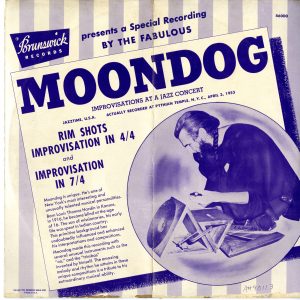
Moondog grew up in the Midwest and became blind at age 16 after playing with a dynamite cap. In the 1940s, he moved to New York City, renamed himself after an ex-pet (a dog who liked to wail at the moon), and stationed himself on a Times Square traffic median where he played his own compositions on instruments that he’d designed and built. Some time during the 1950s, increasing crowds at his performances drove him to relocate to a quieter spot near the corner of 53rd Street and 6th Avenue—and to switch from playing music to standing still for eight hours a day, sometimes reading and selling his poetry. He typically carried a spear, wore a Viking helmet, long beard, and a robe he made from pieces of army blankets. (In 1965, the New York Times reported that he’d changed to a green velvet outfit in order to avoid the “G.I. connotations” of the army blankets).
In the meantime, Moondog also recorded a number of albums for Decca, Prestige, and Columbia and gained recognition as a serious avant-garde composer. Improvisations at a Jazz Concert is the only Moondog record on the Brunswick label. It features two of his self-made, self-designed instruments—the oo (a sort of miniature dulcimer) and the trimba (two small triangular drums with a cymbal attached), as well as his characteristically elastic approach to tempo and meter that he sometimes referred to as “snake time.” Billboard magazine called the EP “one of the unusual recordings of the year” when it came out in 1953, the reviewer suggesting that “those who react to rhythm should be intrigued.”
We’ve included here an excerpt from Side 1, entitled “Improvisation in 7/4.” The EP is available at the SFC, call no. 78-16420.
Improvisation in 7/4 Excerpt

A Moondog documentary is soon to be released, the trailer for which is available here: http://thevikingof6thavenue.com/
Cataloger's Corner: Managed Care Plans–Songs and Music
Newly cataloged and available at the SFC are two releases by Dr. Sam and the Managed Care Blues Band: the full-length album, Minimal Service: CPT 99211, and the single, You Picked a Fine Time to Leave Me Blue Shield (B-side: Mastoid Sally). Liner notes to Minimal Service state that: “These CDs and cassettes are great gift ideas for trade shows, medical conferences, sales reps, party favors, Doctors’ Day, Nurse Day, Nurses Week, Christmas and Chanukah.”
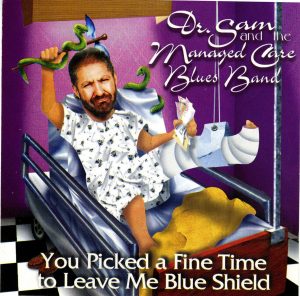
“Dr. Sam” is known in real life as Samuel Bierstock, MD, a practicing physician in Boca Raton, Florida. Since 1996, he has been writing songs on themes of illness, hospital stays, and HMOs, performing and recording them with his blues band in which he sings and plays harmonica. Bierstock and his band have been featured in People Magazine, USA Today and on CNN; they have also mailed their CDs to politicians across the U.S. (including former President Clinton) in order to raise awareness of issues in patient care. The themes tackled by the band are as relevant today as they were in 1990s.

Although, according to the DSATMCBB website, the band’s CDs have been distributed to every member in Congress, the SFC is the only collection listed in Worldcat with copies. In fact, the SFC also appears to be the only repository with holdings in the subject area of “Managed care plans (Medical care) – Songs and music.”
In the track “No Overnight Blues” Dr. Sam sings of a new mother whose insurance company will not pay for an overnight hospital stay.
“No Overnight Blues,” Dr. Sam and the Managed Care Blues Band
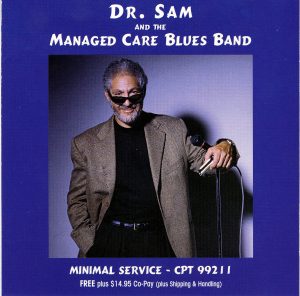
Cataloger's Corner
The Southern Folklife Collection has just cataloged a unique collection of French accordion music CDs. Some of them are re-releases of 1930s recordings, primarily accordion-plus-big band arrangements of foxtrots and waltzes. Others come from the 1980s and 1990s and feature the instrument in genres like disco, boogie, and samba.
Especially noteworthy among this group of CDs is the 1991 reissue of the album Record Musette by accordion virtuoso Michel Pruvot (originally released in 1984). Though he is perhaps best known as the host of the French television show Sur un Air d’Accordéon (On the Accordion), Pruvot has also distinguished himself as a repeat winner of the international Accordion Endurance Competition, able to play continuously for over 117 hours.
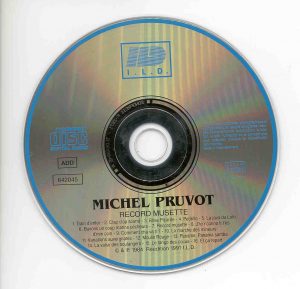
Record Musette features a combination of original Pluvot compositions and covers. The clip included here is his interpretation of “Orange Blossom Special,” a song originally for bluegrass fiddle.
“Orange Blossom Special”
The SFC is proud to be the only repository in North America to have a cataloged copy of Record Musette.

